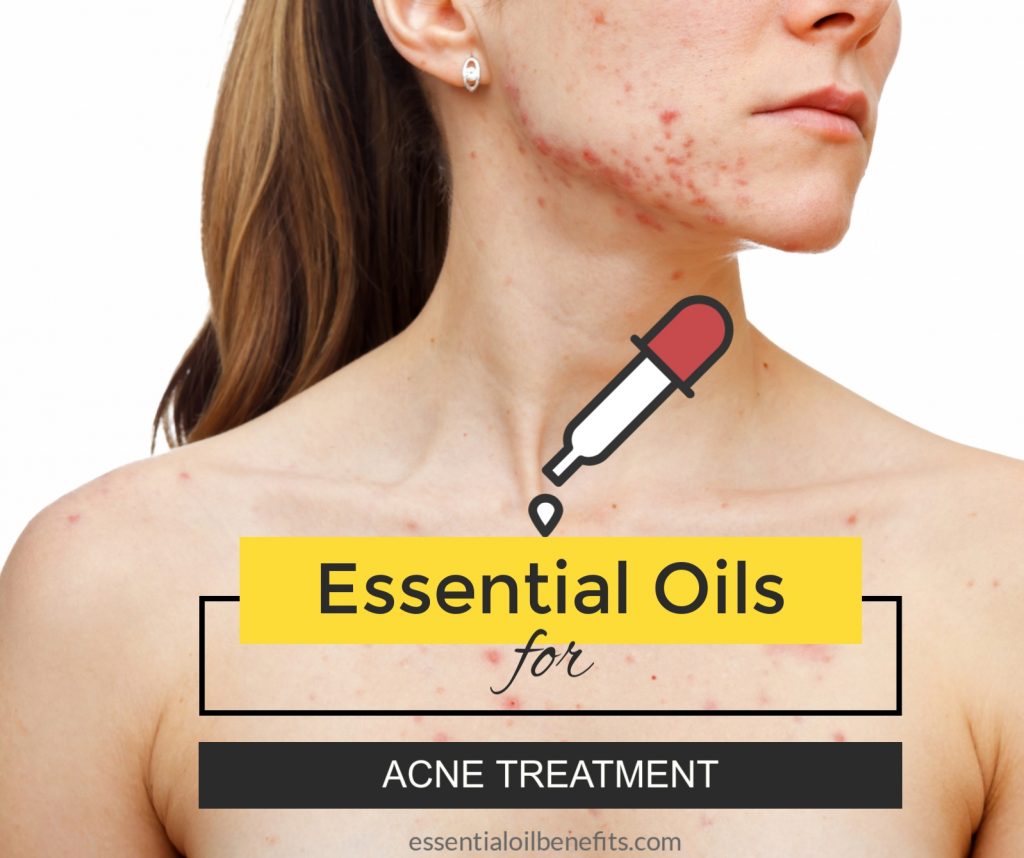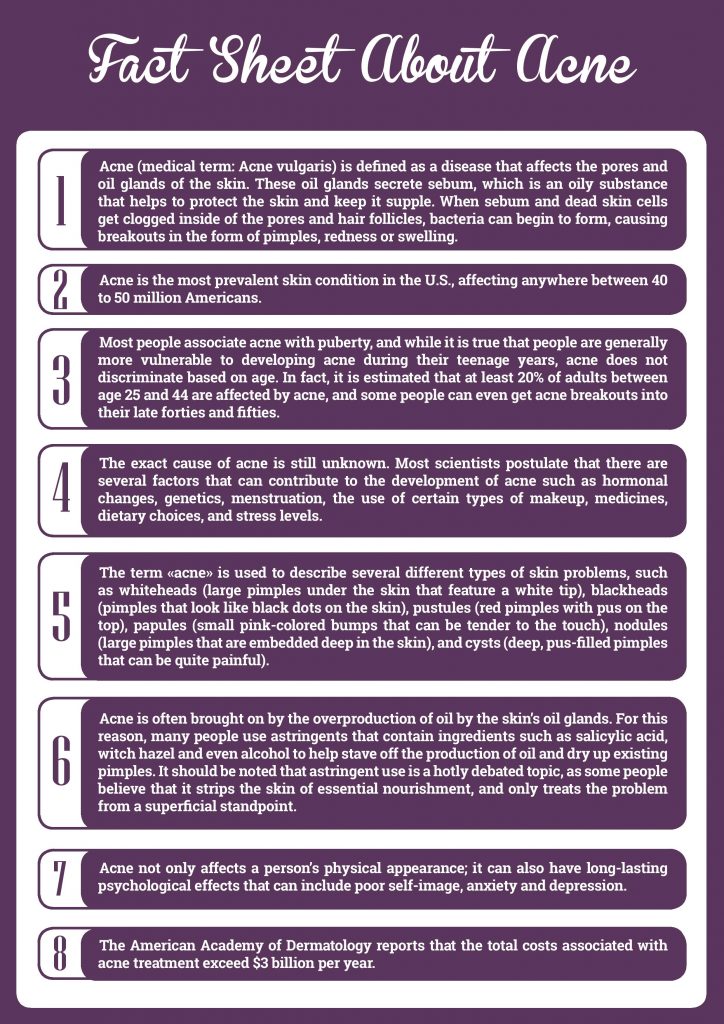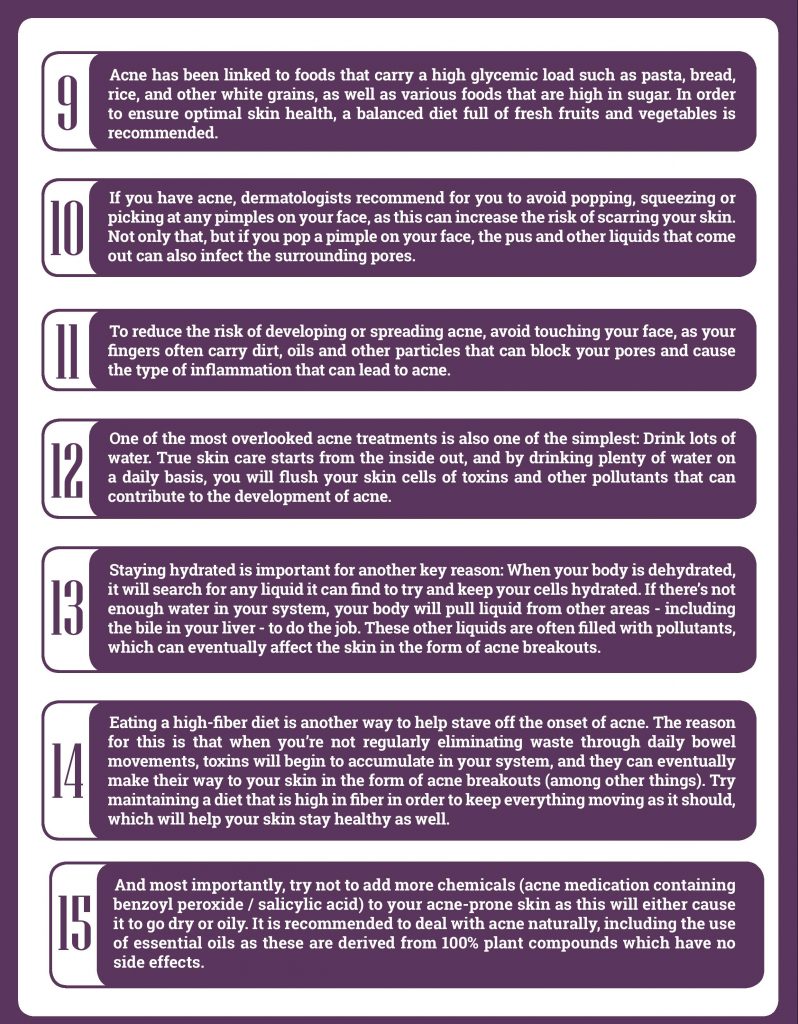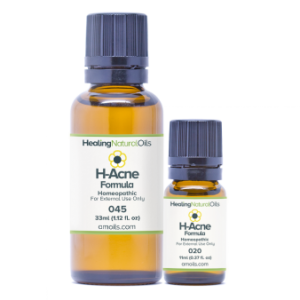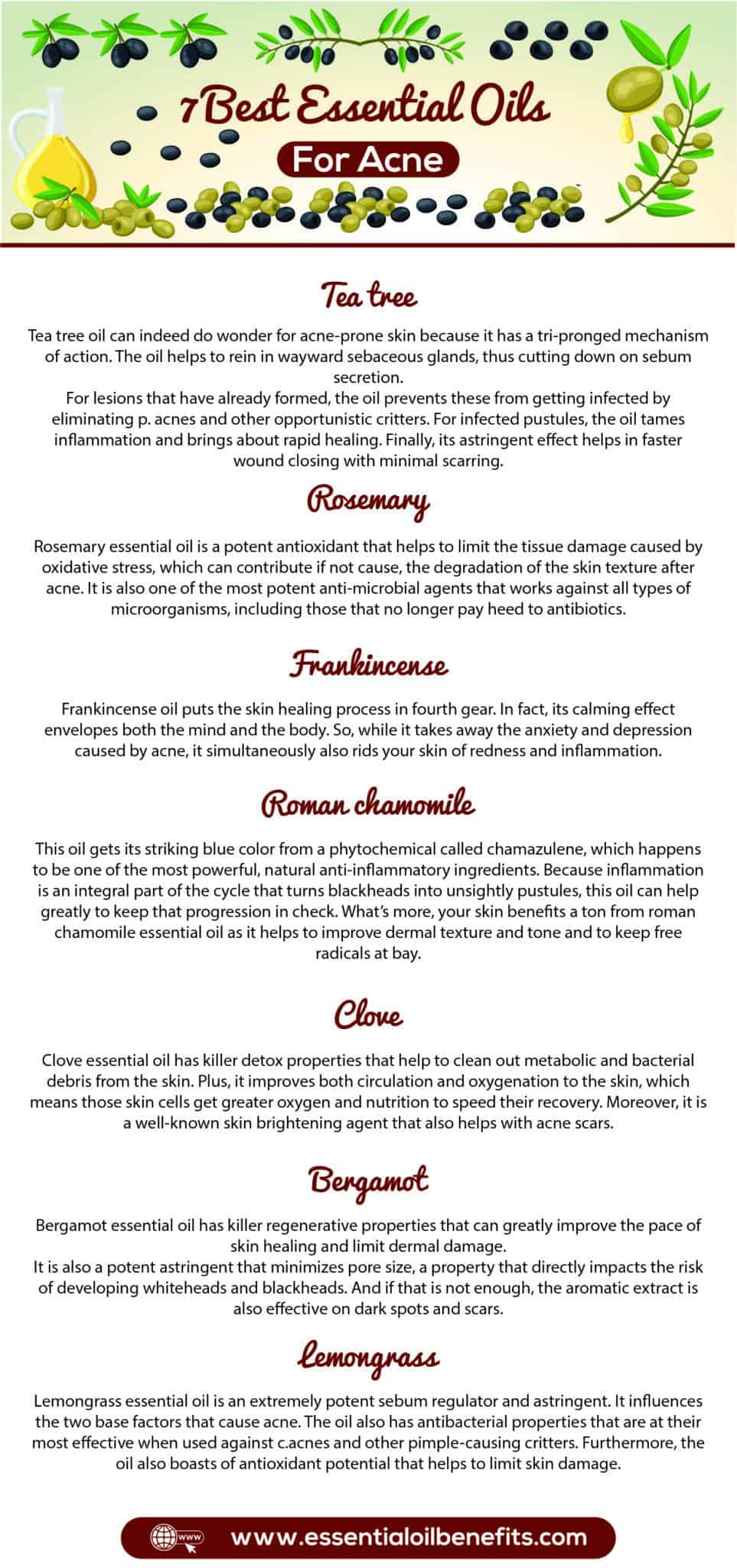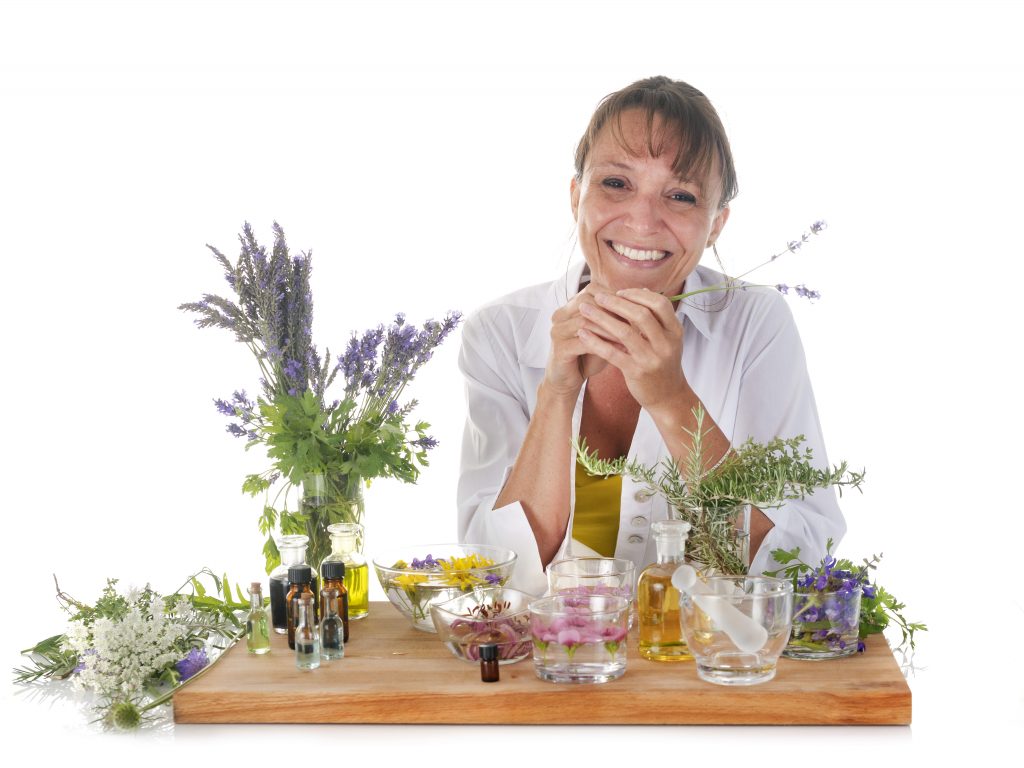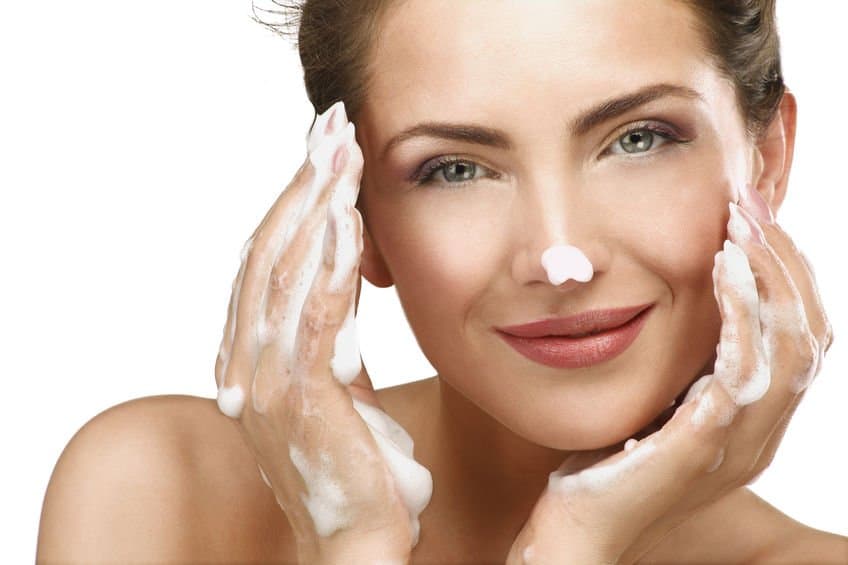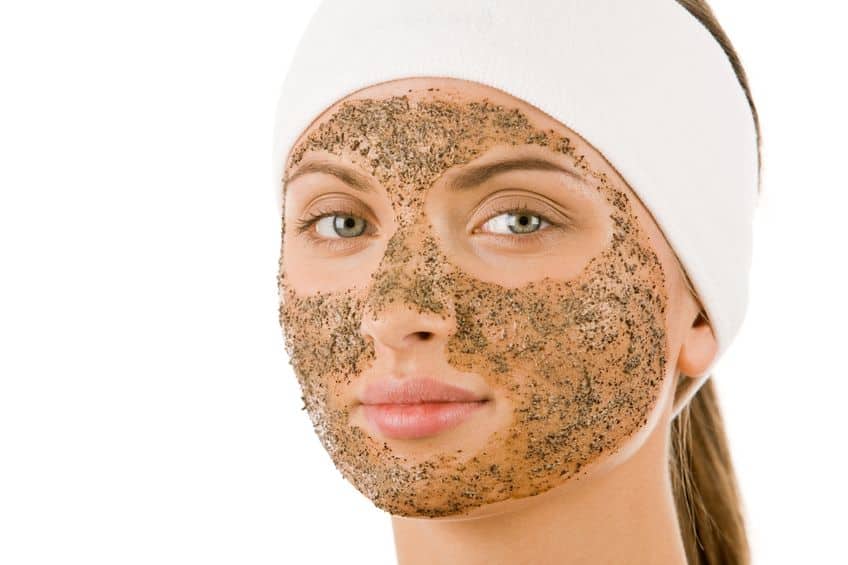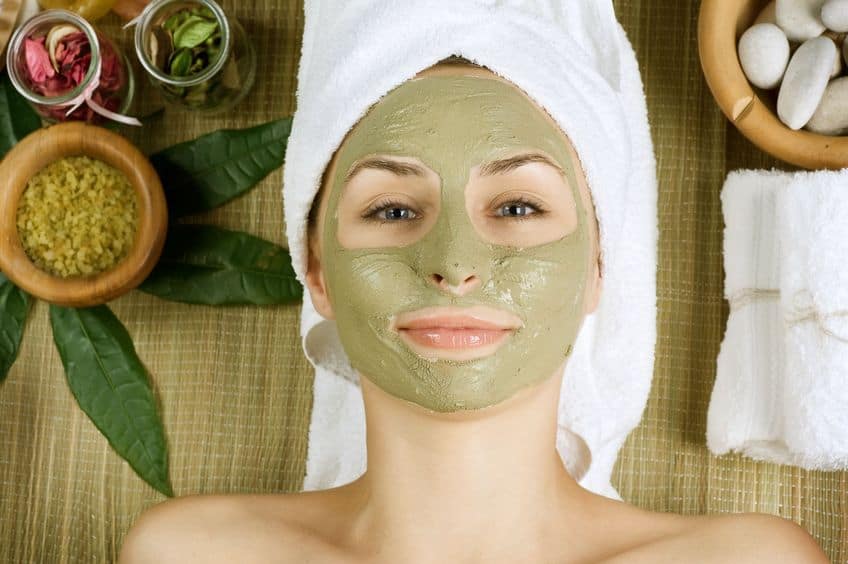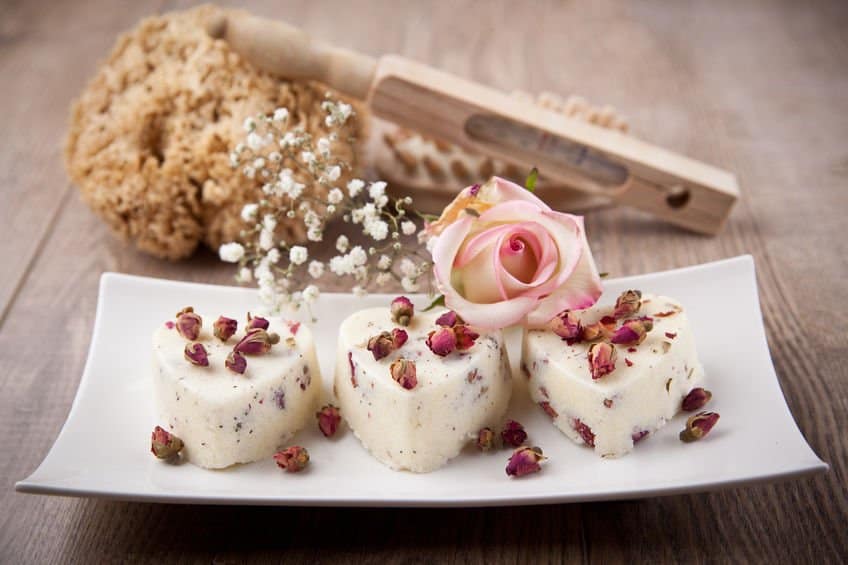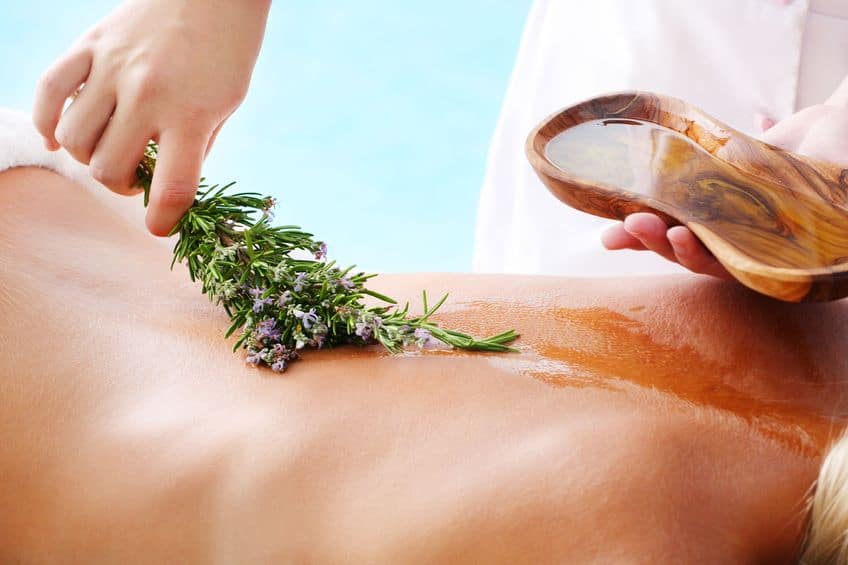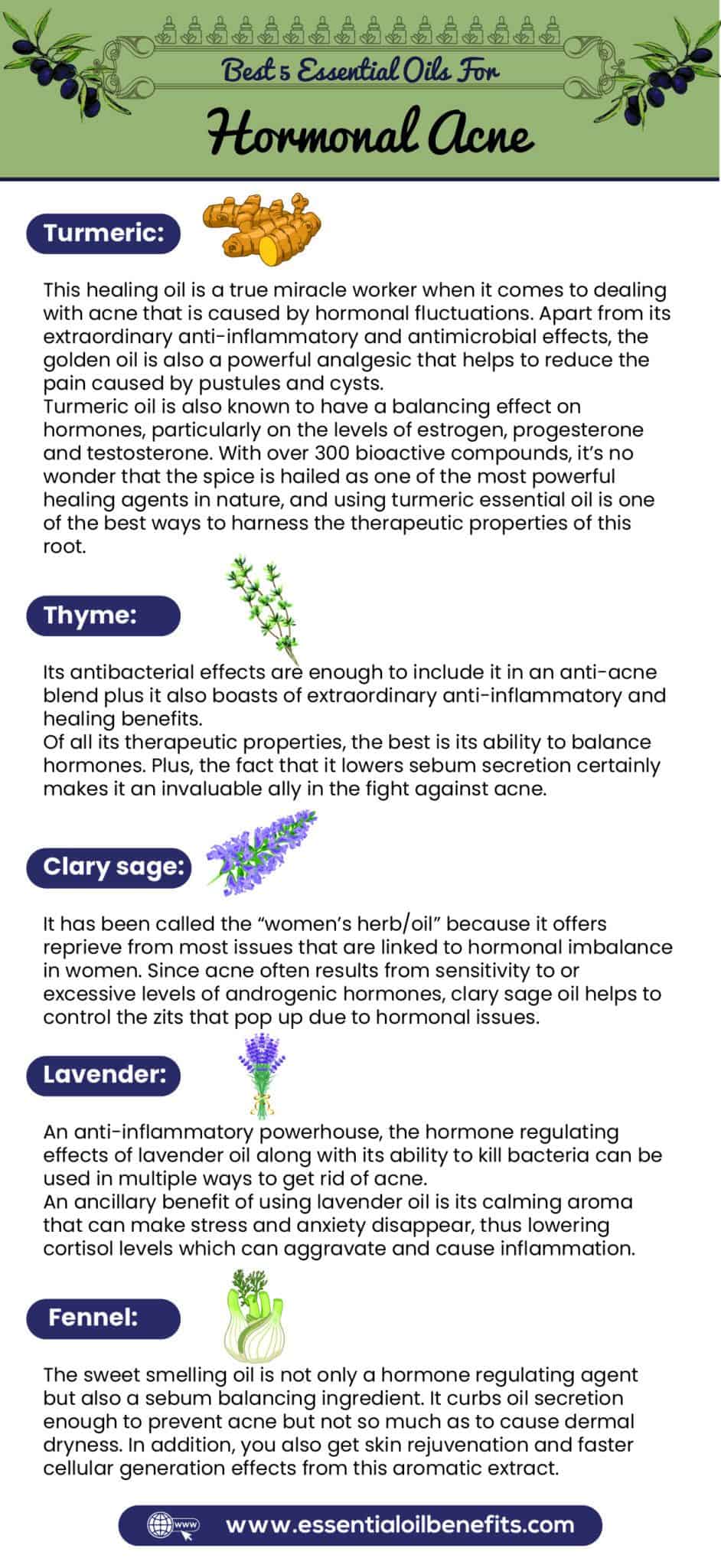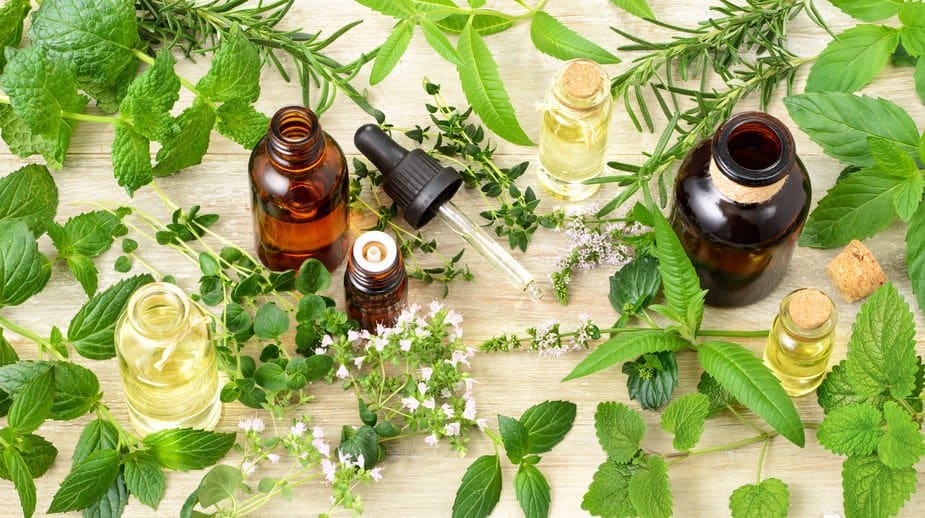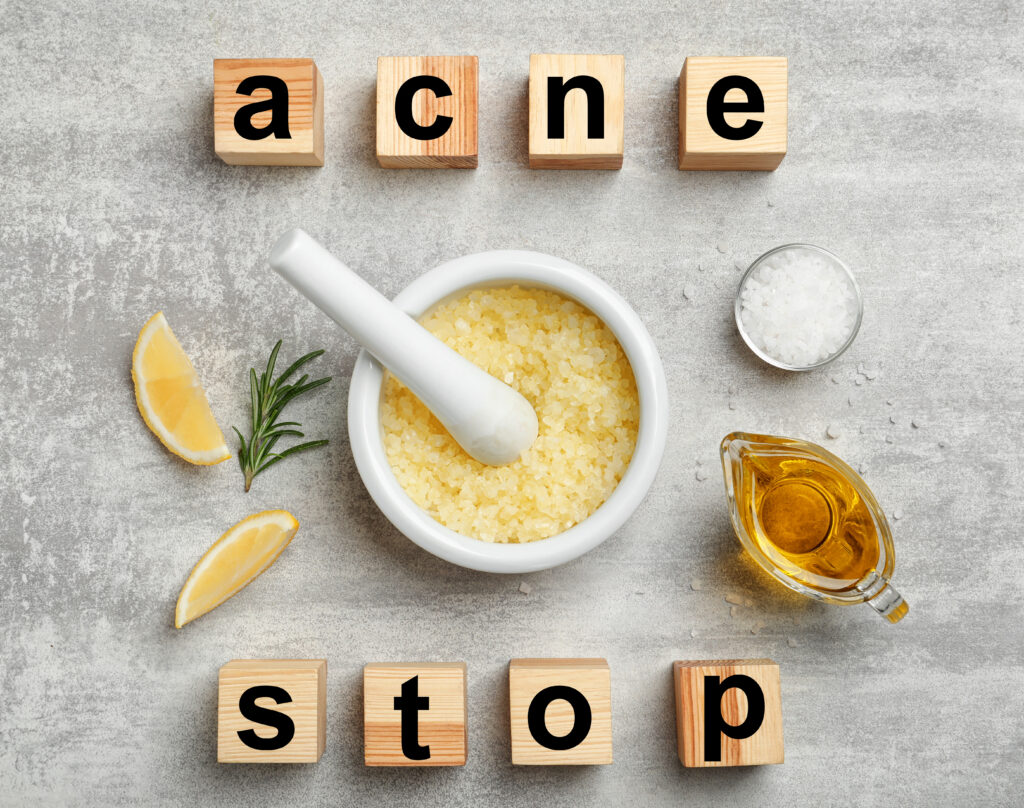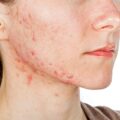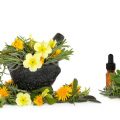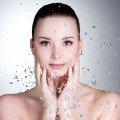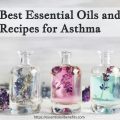Acne is a troublesome skin condition that is primarily caused by inflammation of the oil glands in the pores of your skin. Many times this can be the result of dirt or dead skin cells blocking the pores, but it can also be due to the overproduction of oil by the sebaceous glands. For people who suffer with acne, it can cause quite a bit of emotional distress, and can negatively impact a person’s self-image.
What Is Acne?
A skin ailment that takes on several forms and has a myriad of causative factors, more than 50 million Americans are struggling with acne vulgaris at any given time. Although it is often considered a puberty problem, almost 20-40% people suffer from acne well into their fourth and fifth decades.
The condition is physically harmless, save for the dark spots and scars that it may leave in its wake. But it can have a profound mental impact. The $30 billion that are spent each year to control acne are a clear indication of just how traumatic the condition is.
The term acne vulgaris refers not to the lesions but to the faulty working of the sebaceous glands, which ends up causing those dreadful zits. Medically, the problem is classified either as inflammatory or non-inflammatory. The latter involves whiteheads and blackheads while the inflammatory form of the disorder is associated with pustules, papules, cysts and nodules.
Facts About Acne
The two images below show 15 facts about acne.
What Causes Acne?
In the chronology of acne, the only abnormal aspect is the hyper sebum production, all other factors are a part of the normal dermal chemistry and physiology. But, they create trouble when coupled with the secretions of out of whack sebaceous glands.
It all starts with too much oil, which results from hyper sensitivity to normal levels of testosterone in the body. The excess sebum holds back the dead skin cells, which would otherwise fall off. This sticky mixture plugs the pores and begins to harbor c. acnes (formerly Propionibacterium acnes) bacteria.
These germs are present on everybody’s skin. They only cause a problem when they get a breeding ground inside the pores. This leads to an inflammatory response, and you end up with a pimple.
So anything that causes hormonal fluctuations, such as menstruation, pregnancy, puberty, menopause, stress, certain medication and health ailments, is a potential risk. Similarly, anything that adds to pore clogging can cause or exacerbate acne.
Why Use Essential Oils For Acne?
Essential oils have potent antibacterial properties to help deal with acne breakouts. Here is a full list of why you can and should use essential oils to get rid of acne.
Regulating sebum secretion: With the right blend of oils, you can actually trick the sebaceous glands into believing that they have done their job a bit too well, and hence it’s time for a break. Yes, I know that the idea of using oil goes against everything that you have been told about acne and greasy skin.
But, the oil is part of your skin’s defense mechanism so the more you scrub it out the more gets secreted. The trick is to make your body believe that there is already enough oil hence no reason to make more and this can only be achieved with an oil blend.
Making those pores behave themselves: The right mixture of oils not only curbs sebum production but also shrinks those pores, squeezing out the oils held inside.
To slough away cellular debris gently: Since the dead skin cells are a part of the skin’s lipid barrier, the best way to take away their adhesion is to use oil to melt the lipids that hold the cellular debris together.
To kill the germs: Acne causing bacteria are not only notorious for their virulence but also for their ability to develop resistance to antibiotics. This makes essential oils a safer and more effective choice for dealing with these critters, particularly since they not only eliminate p. acnes but also other opportunistic critters.
Controlling inflammation: If you are already dealing with pustules and papules, essential oils can stop the inflammation from getting out of hands and causing long lasting skin damage.
To speed up healing: These aromatic extracts also bring about a significant increase in cellular regeneration rates. So, the lesions heal faster and with less scarring and hyperpigmentation.
To deal with the scars and dark spots: Finally, essential oils help to erase acne linked dark spots and hyper pigmentation and improve overall skin texture and complexion.
And if all of that isn’t enough, these oils are just as effective on all the emotional repercussions of acne. Be it depression or anxiety, the aroma of these oils will help you to shoo away all forms of negativity from your life.
Recommended Natural Product For Acne Treatment
A natural treatment alternative for acne, H-Acne from AMOILS gets rid of all forms of acne including acne vulgaris, whiteheads, blackheads and pimples as well as their associated symptoms on the face, forehead and back. Read my review this product for more details.
Best Essential Oils For Acne
Here are the best essential and carrier oils that can be used in the fight against acne.
1. Tea tree
This humble oil from Australia has enjoyed a stellar fan following for the last several years and for good reason. You will often find the multi-billion dollar anti-acne products sector downplaying the efficacy of tea tree oil in dealing with the troublesome skin condition, including shooting down clinical studies that prove it. Yet, these manufacturers continue to use this natural ingredient in their pimple-control products.
The truth is that tea tree oil can indeed do wonder for acne-prone skin because it has a tri-pronged mechanism of action. The oil helps to rein in wayward sebaceous glands, thus cutting down on sebum secretion.
For lesions that have already formed, the oil prevents these from getting infected by eliminating p. acnes and other opportunistic critters. For infected pustules, the oil tames inflammation and brings about rapid healing. Finally, its astringent effect helps in faster wound closing with minimal scarring. So now you know why so many people rave about the anti-acne benefits of this oil!
2. Rosemary
Another all-rounder, this spice oil works on multiple fronts to control and heal acne. It is a potent antioxidant that helps to limit the tissue damage caused by oxidative stress, which can contribute if not cause, the degradation of the skin texture after acne. It is also one of the most potent anti-microbial agents that works against all types of microorganisms, including those that no longer pay heed to antibiotics.
3. Frankincense
Extracted from a resin that is known to offer a boat load of health benefits, this oil puts the skin healing process in fourth gear. In fact, its calming effect envelopes both the mind and the body. So, while it takes away the anxiety and depression caused by acne, it simultaneously also rids your skin of redness and inflammation.
4. Roman chamomile
This oil gets its striking blue color from a phytochemical called chamazulene, which happens to be one of the most powerful, natural anti-inflammatory ingredients. Because inflammation is an integral part of the cycle that turns blackheads into unsightly pustules, this oil can help greatly to keep that progression in check. What’s more, your skin benefits a ton from roman chamomile essential oil as it helps to improve dermal texture and tone and to keep free radicals at bay.
5. Clove
I know these are pimples and not a tooth pain that we are talking about. But, the only reason, this pungent oil works so well on dental pain and gum infection and sore/swollen gums is because it is both a powerful numbing and antimicrobial agent. When used, with discretion, it also helps in other ways.
Clove essential oil has killer detox properties that help to clean out metabolic and bacterial debris from the skin. Plus, it improves both circulation and oxygenation to the skin, which means those skin cells get greater oxygen and nutrition to speed their recovery. Moreover, it is a well-known skin brightening agent that also helps with acne scars.
6. Bergamot
This oil has earned itself a bad rep owing to its potential to cause phototoxicity. In reality, it is just one component in the oil, known as bergaptene, which is to be blamed for this effect. The good news is that you can get a bergaptene free version of the oil, which will provide all of its therapeutic benefits without the side effects.
Bergamot essential oil is not only popular for its invigorating aroma that is at once citrusy, herbaceous and sweet but also for its sebum regulating benefits. Moreover, the oil has killer regenerative properties that can greatly improve the pace of skin healing and limit dermal damage.
It is also a potent astringent that minimizes pore size, a property that directly impacts the risk of developing whiteheads and blackheads. And if that is not enough, the aromatic extract is also effective on dark spots and scars.
7. Lemongrass
A whiff of the lemony-herbaceous fragrance of this oil will remind you of the last time you had Thai curry. But the grassy goodness of this herb can be used for more than just to flavor curry. Lemongrass essential oil is an extremely potent sebum regulator and astringent.
So, it influences the two base factors that cause acne. The oil also has antibacterial properties that are at their most effective when used against c.acnes and other pimple-causing critters. Furthermore, the oil also boasts of antioxidant potential that helps to limit skin damage.
Best 3 Carrier Oils For Acne Prone Skin
The carrier oil used to dilute the essential oils is very important to the overall performance of the blend. If you pick the wrong fixed oil, you will not just take away from the effectiveness of the aromatic extracts, but actually contribute to your acne problem because some carriers add to the pore clogging effect of thick sebum.
So, here are the two things to look for when picking carrier oils for acne-prone skin
- A low comedogenic rating, which means the oil won’t clog the pores.
- Higher amount of linoleic acid. This is an Omega 6 fatty acid that offers anti-inflammatory benefits and makes the sebum less viscous. Those with acne prone skin have a lower proportion of linoleic acid in the skin’s lipid matrix.
Here is a list of oils that meet both these requirements:
1. Hempseed oil
A non-comedogenic oil with a light texture and exceptional skin healing and moisturizing properties that also happens to have 54.5% linoleic acid content.
2. Safflower oil
A silky oil that nourishes the skin without leaving behind a greasy feel, this oil has long been a staple in Ayurveda for skin care.
3. Argan oil
Just about every skin care product maker is capitalizing on the healing and moisturizing benefits of this oil. The good news is that even those with acne prone skin can enjoy its therapeutic benefits without worrying about pore clogging.
Those with mild to moderate acne can also afford to opt for oils that have a low comedogenic rating (1-2). In fact, you will find several popular choices in this category such as rosehip seed, grapeseed, pumpkin seed, sea buckthorn, walnut and jojoba oil.
Infused oils can also be effective for acne prone skin as long as you work with the right herbs. Ashwagandha and calendula macerated oils are particularly effective against blemishes and can add greatly to the anti-inflammatory and antiseptic effects of the essential oils in the blend.
The 15 Best Essential Oil Recipes For Acne
Although this is a compilation of 15 top anti-acne recipes with essential oils, we will be using a master blend very often. Think of this as the “does-it-all” mixture that can be used in a host of ways not only to treat and control those pesky pimples but also to deal with the scar-ry aftereffects of the acne. For the “Essential Oil Acne Blend”, you will need:
- 30 drops tea tree essential oil (for its antibacterial and anti-inflammatory effects)
- 10 drops sandalwood essential oil (Australian or Indian) (for its ability to calm the skin)
- 15 drops palma rosa essential oil (for its extraordinary effects on inflammation)
- 7 drops peppermint essential oil (for its antibacterial and anti-inflammatory effects)
- 7 drops turmeric essential oil (for its ability to bring about rapid wound healing)
Method:
Mix the essential oils in a glass bowl and transfer the blend into a dark colored glass bottle. Store the bottle away from to light, heat and moisture. I would highly recommend that you use a dropper insert in the bottle. So, when you need to use the blend, you can simply open the cap and pour out the required number of drops.
1. Medically proven acne remedy gel
- 5 drops tea tree essential oil
- 2 drops copaiba essential oil
- 4 drops cinnamon essential oil
- 30 ml aloe vera gel
Method:
Mix the ingredients and store in a dark glass jar. If you are using home-made aloe gel, you will have to store this blend in the refrigerator. Store-bought aloe gels do contain preservatives and this is the rare occasion on which I am not against using such products simply because they make life simpler.
Once you have prepared the gel, use it as a spot treatment on pustules and papules and overly-oily and acne prone areas of the face. Use twice a day on the zits and once a day as a preventative measure.
Do not use this gel on open or oozing wounds. Allow scan formation before applying the gel. Let the gel dry on your skin after application and wait for 5-6 hours before washing your face. Do not use it on the skin around the eyes.
2. Castile Facial Cleanser
- 30 drops of the “Essential Oil Acne Blend”
- 2 oz. (60 ml) jojoba oil
- 2 oz. (60 ml) natural aloe vera gel
- 4 oz. (120 ml) liquid castile soap
Method:
Mix the ingredients and transfer into a pump bottle. Use as you would any facial cleanser.
3. Honey Face Facial cleanser
- 1 tbsp honey
- ½ tsp green tea powder
- 4 drops essential oil anti-acne blend
Method:
This is an exceptionally gentle yet incredibly effective cleanser for those with acne-prone skin. In fact, it works on all types of acne and can be combined with any other treatment modalities that you may be using.
Mix the ingredients in a small glass bowl and apply all over your face and neck, avoiding the area around the eyes and the hairline. Leave the cleanser on your face for 10-15 minutes then wash off with tepid/room temperature water.
4. Sesame and Flax Meal Face Scrub
- 9 drops lavender
- 4 drops each geranium and frankincense
- 1 oz. (30ml) rosehip oil
- 1/2 cup combined sesame seed and flax seed meal
Method:
Mix all the ingredients and store in a wide mouthed glass jar with an air tight lid. To use, lightly massage the mixture on your face and neck, but stay away from the fragile eye area. Rinse with tepid water.
5. Yoghurt Face Scrub
- 2 tbsp Greek yoghurt (don’t discard the whey (water) on top of the milk solids)
- 1 tsp orange peel powder/green tea powder
- 4 drops Essential Oil Acne Blend
This is not a scrub that has to be made fresh every time you want to use it. On the bright side, it is real easy to make because all you have to do is throw the ingredients into a glass bowl and give them a good whisk. Then, use as you would any facial scrub. To wash, use tepid/warm water.
Tip: Don’t scrub your face if you have inflamed acne lesions.
6. Clay Face Mask
- 1 tbsp French green clay/Fuller’s earth
- 1 tbsp raw honey (Manuka preferred)
- 1 tsp apple cider vinegar
- 2 drops each tea tree and bergamot essential oils
- Rose water or any other hydrosol of your choice as required
Method:
Mix the ingredients together to form a paste with the consistency of cake batter. Apply all over your face and neck, avoiding the area around the eyes, the eyebrows and the hairline. Give the mixture 15-20 minutes to work on your skin. Then, rinse off with tepid/room temperature water.
7. Herbal Face Mask
- 1 tsp rose petal powder
- 1 tsp licorice root powder
- Aloe vera gel as require (home-made preferred)
- 3 drops Essential Oil Acne Blend
Method:
Mix all of the ingredients to make a smooth paste. Apply this paste on your face (staying away from the area around the eyes and the eyebrows. Keep the mixture on your skin for 15 minutes before washing it off with tepid water.
8. Fruity Face Mask
- 1 teaspoon papaya puree, pineapple puree or fresh lemon juice or water
- 3 drops from the “Essential Oil Acne Blend”
- 2 teaspoons cosmetic clay like French green clay, Bentonite clay, rhassoul clay, multanimitti clay or glacial clay
Mix all the elements to form a smooth paste. Use this paste on the face (staying away from the delicate eye region) and allow it to dry. Clean it off with tepid water.
9. Facial Steamer
- 5 drops oregano essential oil
- 8 drops Frankincense essential oil
Method:
Add the essential oils to 125 ml water and use it in your facial steamer or sauna. Oregano essential oil has strong antimicrobial and antibacterial properties that is a natural alternative for treating acne.
10. Facial Toner
- 10 drops of the Essential Oil Acne Blend
- 100 ml of rose/ helichrysum / lemon hydrosol
Method:
Pour the hydrosol in a spritzer bottle and add the essential oil blend to it. Put the spritzer cap back on and give the bottle a good shake before spraying it on your face (Keep your eyes closed as you spray and as far as possible stay away from the eyelids). Another way is to apply the toner with a cotton ball.
11. Facial Massage Oil
- 30 ml grapeseed oil
- 15 ml tea seed oil (this is a carrier oil and not the same as tea tree essential oil)
- 15 drops Essential Oil Acne Blend
- 7 drops myrtle essential oil
- 9 drops petit grain essential oil
Method:
Mix the oils and store in a dark glass bottle. Apply 3-5 drops of the blend all over the face and the neck.
12. Bath Salts
- 1 cup Epsom salts
- ½ baking soda
- 1 tbsp milk/1 tsp light carrier oil
- 7 drops essential oil anti-acne blend
Method:
Mix the oils/oil and milk together in a small bowl and set aside. Run a hot bath and when the tub is half full add the salts to the water. Once the tub is full, add the oil mixture and agitate the water to disperse the blend. Soak yourself in the bath for 20 minutes.
13. Bath Tea
- 1 cup neem leaves (powder/pieces)
- 1 cup rose petals
- ½ cup dry lavender flowers
- ½ cup dry chamomile flowers
- 5 drops each clary sage and geranium essential oils
Mix the plant ingredients together and then add the essential oils to the mixture. Fill into bath tea bags (homemade or store bought) or simply store in an airtight glass jar. If you have your bath tea bags all filled and ready to go, you simply have to dip one into the tub while you draw your bath.
If not, put 2 heaped tbsp. of the mixture into a clean sock or a handkerchief, tie its mouth with a ribbon or even a hair tie and use as you would a bath tea bag.
14. Anti-acne poultice
- ½ cup fresh kitchen herbs (whatever you have around: basil, thyme, rosemary, peppermint, oregano, sage, etc.)
- 2 drops Essential Oil Acne Bend
Grind the herbs to a paste in the mortar or in the food processor. Place the herbal mixture into the microwave for 5-7 seconds. You want it to be arm not hot or cooked. Remove and add 2 drops of the essential oil blend to it and place it on the zit covered areas. Lie down to prevent the mixture from rolling off your face.
Give it about 10 minutes on your skin. Then wash off with cold water. Only use this poultice on the acne affected areas of your face and not all over. If you have very sensitive skin, add about a teaspoon or two of almond/sesame milk to the herb paste.
15. Anti-acne body Oil
- 15 drops Essential Oil Acne Blend
- 1 oz. (30 ml) safflower oil
Method:
Mix the oils and store in a dark glass bottle. Use it as an after-shower oil. Massage it on your skin while it’s still damp from the shower.
Best 5 Essential Oils For Hormonal Acne
1. Turmeric
This healing oil is a true miracle worker when it comes to dealing with acne that is caused by hormonal fluctuations. In fact, the golden spice and the essential oil extracted from it have long been used in beauty and skincare formulations by Ayurvedic practitioners.
Apart from its extraordinary anti-inflammatory and antimicrobial effects, the golden oil is also a powerful analgesic that helps to reduce the pain caused by pustules and cysts.
Turmeric oil is also known to have a balancing effect on hormones, particularly on the levels of estrogen, progesterone and testosterone. With over 300 bioactive compounds, it’s no wonder that the spice is hailed as one of the most powerful healing agents in nature, and using turmeric essential oil is one of the best ways to harness the therapeutic properties of this root.
2. Thyme
Do not underestimate this oil just because it comes from a common kitchen herb; this one is a mean, green bacteria killing machine inside a bottle. And if its antibacterial effects are not enough to include it in an anti-acne blend, it also boasts of extraordinary anti-inflammatory and healing benefits.
But, of all its therapeutic properties, the best is its ability to balance hormones. Plus, the fact that it lowers sebum secretion certainly makes it an invaluable ally in the fight against acne.
3. Clary sage
It has been called the “women’s herb/oil” because it offers reprieve from most issues that are linked to hormonal imbalance in women. Since acne often results from sensitivity to or excessive levels of androgenic hormones, clary sage oil helps to control the zits that pop up due to hormonal issues.
4. Lavender
If you have dabbled with essential oils at all, you must have already experienced the healing and soothing effects of this oil. An anti-inflammatory powerhouse, the hormone regulating effects of this oil along with its ability to kill p. acnes bacteria can be used in multiple ways to get rid of acne.
An ancillary benefit of using lavender oil is its calming aroma that can make stress and anxiety disappear, thus lowering cortisol levels which can aggravate and cause inflammation.
5. Fennel
It may not be as popular as some of its brethren from the essential oil family, but it is by no means any less potent than them. The sweet smelling oil is not only a hormone regulating agent but also a sebum balancing ingredient.
It curbs oil secretion enough to prevent acne but not so much as to cause dermal dryness. In addition, you also get skin rejuvenation and faster cellular generation effects from this aromatic extract.
Easy Essential Oil Recipes For Hormonal Acne
1. The balancing and hydrating spray
- 40 ml rose/lemon/helichrysum hydrosol (rose is the most easily available but helichrysum is the best)
- 2 tbsp witch hazel extract (hydrosol not alcoholic tincture)
- 1 tsp hempseed oil
- 3 drops each of lavender and turmeric
- 2 drops thyme
Method:
Mix the oils separately and then add the blend to the rest of the ingredients. Pour into a bottle with a spritzer head. Give the formulation a vigorous shake before using it. You can spray it on a ball of cotton wool and apply it only on the affected part or you can spray it all over your face and neck, but avoid the area around the eyes. Use the spray twice a day on cleansed skin and apply before using any other product.
2. The healing mask
- 1-2 tbsp French green clay/Rhaasoul clay
- 2 tbsp aloe vera gel (home extracted and not the green gel-like OTC product)
- 2 tbsp raw honey (preferably manuka)
- ¼ tsp cinnamon powder
- 2 drops each of clary sage and fennel essential oils
- 3 drops sandalwood essential oil
- Almond milk/butter milk as required
Method:
Mix all the ingredients together to form a paste, with the consistency of cake batter. Apply using a face mask brush in a medium thick layer. Avoid the area around the eyes, the eyebrows and the hairline. Give the mask 15 minutes on your skin and then wash off with warm water.
Other Ways To Use Essential Oils For Acne
1. The hormone balancing serum
- 30 ml hemp seed oil and 30 ml evening primrose oil
- 5 drops each of sweet basil, clary sage, bergamot and turmeric
- 3 drops each of ylang ylang and thyme
- 6 drops each of lavender and jasmine
Method:
Mix the oils and store in a dark glass bottle. Use 3-4 drops of the blend on the inside of both wrists or on the neck. Apply as you would any medicated cream/ointment and let your skin soak up the oils.
Use once a day for a period of 2 months and then take a break of 15 days. For cyclic acne that appears at certain times in your monthly cycle, use after ovulation and right through the heavy bleeding days; then stop.
2. The anti-inflammatory smoothie
- 2 tbsp hemp protein
- ½ cup berries (strawberries, blueberries or any other)
- ½ medium sized carrot
- 1 drop each of ginger and turmeric essential oils
- 2 tbsp manuka honey
- I tsp chai seeds (soak till turgid and drain)
- 1 cup almond milk
Throw in all the ingredients except the chia seeds in the blender and process for 2-3 minutes. Put the drained chia seeds into a tall glass and pour the smoothie on top. Garnish with berries or other fresh fruits.
Basic Precautions To Take When Using Essential Oils To Treat Acne
- Some essential oils can be photosensitive, i.e. they react with light adversely: citrus oils such as lime, lemon, orange, grapefruit and bergamot are known to be photosensitive.
- Make sure that the essential oil you are using doesn’t go into your eyes, nose or the ear canal. After the application, make sure that you don’t rub your eyes or touch the interior of your nose.
- Consult your doctor if you are already suffering from a medical condition.
- People with medical conditions like high blood pressure, asthma and epilepsy should consult their doctor prior to using essential oils.
- When using essential oils in bath water, make sure that you agitate the water properly to avoid oil pooling up at one location.
11 Natural Remedies & Lifestyle Changes To Deal With Acne
Many of the creams and facial cleansers on the market that are intended to treat acne contain harsh chemicals and drying agents that strip the skin of its natural moisture, often doing more harm than good. For this reason, many people have turned to using all-natural or homemade remedies in order to clear up bumps, pimples and blemishes on their skin. Below are some of the most commonly used (and most effective) home remedies / lifestyle changes to get rid of for acne.
1. Adaptogenic, anti-inflammatory teas
Adaptogenic herbs like ashwagandha, holy basil, chamomile, lavender and echinacea can go a long way in healing the body from the inside out. These herbs can help to tame the body’s inflammatory response and boost natural healing. The simplest way to enjoy the anti-inflammatory benefits of these botanicals is to brew yourself a refreshing tea with these herbs.
Add a few slices of fresh ginger root to the tea along with some honey to taste and you will end up with a refreshing concoction that heals the mind and the body. Although rare in the West, fresh turmeric root, if it can be found, will be an exceptional addition to the brew.
2. Gentle herbal exfoliation
While you are using essential oils to keep sebum secretion in control, it is also important to deal with the cellular debris that contributes to pore clogging and the best way to free your skin of dead cells is through exfoliation. You do not have to scrub your skin raw to keep zits away.
Au contraire, what you should be doing is using a gentle herbal scrub to slough away those dead cells. Make one by mixing 2 cups oatmeal with ½ cup matcha and ½ cup licorice root powder. To use, soak the mixture in some butter milk or almond milk for 1-2 minutes and then use it on your face as you would any exfoliating product.
3. Yoga to calm the skin
This may come as a surprise since many actually believe that a yoga workout can cause a break out. In reality, it is not so much the physical activity as the sweat that can be a problem. If you don’t clean the mixture of sweat, sebum, dirt and cellular and metabolic waste from your skin, it can clog those pores and cause acne.
So, always keep a spritz bottle with some chilled green tea on hand. Simply spray the concoction on your warmed skin and wipe away the dirt. That said, nothing beats sun salutations and poses like the warrior pose and the triangle pose to balance the hormones and keep stress away. Find out the best yoga poses to clear acne.
Want to learn more about essential oils for yoga and meditation, click here.
4. Nutritional support for clear skin
Supplementing with Omega 3 fatty, probiotics, vitamin A, C and E and zinc can help to bring acne under control. Similarly, herbs like shatavari, guggul, triphala and neem can help to keep the body calm on the inside and help with frequent breakouts. But, it is crucial to consult with a naturopath before using these supplements.
5. Eat right to get rid of the blemishes
Dairy, gluten, refined carbs, sugar, hydrogenated oils, fast foods and carbonated beverages are known to cause inflammation in the body. Plus, they also have a detrimental effect on the body’s hormone balance. So, if you are suffering from acne, stay away from such foods and go healthy with your eating habits.
6. Don’t throw away your banana peel
Most of us are familiar with the nutritional benefits of bananas, but did you know that even the part that you throw away can be put to good use as well?
That’s right – banana peels are actually one of the best kept secrets for reducing the inflammation responsible for acne. Simply peel a regular banana and eat it (hey, you don’t want good food going to waste), and then take the peel and start rubbing the inside of the peel (the side that has been in contact with the banana itself) on your face using a circular motion.
The somewhat filmy substance found on the inside of the peel contains a powerful antioxidant known as lutein, which can reduce inflammation and swelling (this especially helps when you have those bumps that are huge, red and sore). After leaving this “banana film” on your face for about 5 to 10 minutes, rinse it off thoroughly. You can repeat this routine once per day to provide benefits to your skin, and to your diet as well!
7. Baking soda
Baking soda (a.k.a. sodium bicarbonate) is a fantastic and highly versatile substance that is used in countless home remedy applications, and it can work wonders on your skin as well.
Mix equal parts baking soda and water to create a type of paste that you can use as a natural facial mask. Apply this “baking soda mask” to your face by gently rubbing it onto your skin using a circular motion, and then let it sit for about 15 to 20 minutes.
Rinse it off with warm water and pat your face dry. The antiseptic properties of baking soda will go to work on your skin, combating microscopic bacteria that can be responsible for acne breakouts. In addition, the baking soda paste will dry up the excess oil on your face, reducing the risk of acne flare-ups due to oil overproduction.
8. Apple Cider Vinegar
Apple cider vinegar is a superstar household ingredient for a number of reasons, one of which is that it can be used as a highly effective skin toner.
Keep in mind that apple cider vinegar is rich in acetic acid, as well as a variety of enzymes that can kill bacteria and fungi on the skin, thereby eliminating one of the primary sources of chronic acne flare-ups.
Simply dab some apple cider vinegar on your face using a cotton ball, concentrating on the areas of your skin where acne flare-ups are present. For many people, this would be what is known as the “T-zone”, which is the area covering the forehead, nose and cheeks. Try applying this apple cider vinegar toner once in the morning and once in the evening for best results.
9. Yogurt and honey mix
These two ingredients already make for a delicious snack, but they are also frequently used to treat acne breakouts. So why yogurt and honey in particular?
Well, yogurt contains antibacterial acids that can kill the bacteria responsible for acne, while honey contains powerful anti-inflammatory properties that can reduce swelling. In addition, honey is what is known as a humectant, which is a natural substance that helps the skin retain its moisture.
Combine one tablespoon of plain yogurt (full fat) with one tablespoon of raw honey to create a natural skin mask. Apply this mixture to your face and let it sit for about 10-15 minutes, and then wash it off using a clean, damp washcloth.
10. Tea tree oil toner
This powerful natural essential oil is derived from a tree that is native to Australia, and has been used for centuries in Aboriginal homeopathic medicine. Tea tree oil has strong astringent properties that can actually cut through the dirt, oil and dead skin that can often clog pores and trigger breakouts.
Create a mixture comprised of one part tea tree oil to nine parts water. Now dip a cotton swab or Q-tip into the mixture and then spread it on the areas of your face where bumps, pimples and/or flare-ups are present.
Tea tree oil is far superior to the many harsh facial cleansers on the market that contain alcohols or salicylic acid, both of which can produce excessive dryness of the skin. Just be sure that you have adequately diluted the tea tree oil, as it is not advisable to apply it directly to the skin due to its potency.
11. Drink lots and lots of water
One of the most overlooked aspects of treating acne is that the skin must be healed from the inside out. What this means in practical application is that you have to keep your skin hydrated in order for it to function in a healthy manner.
When your skin does not get enough moisture, it will pull various fluids from different areas of the body (even including the bile) in order to get the hydration it needs. The problem with this is that many of these fluids are waste products in the body, which can produce inflammation in the skin.
For this reason, it is vitally important so you to drink plenty of water every day. Not only will water help hydrate the skin, but it will also flush out toxins that can produce the inflammation that leads to acne breakouts.
Nutritional experts recommend that you drink at least eight 8-ounce glasses of water per day, but you can also eat water-rich foods such as fruits and vegetables in order to add to your hydration quotient. This one step can produce dramatic results in the appearance of your skin, so be sure to put it to work!
The Final Word
Essential oils and their combinations could be great allies in the fight against acne. Consider the type of skin you have and the acne you are dealing with before making your choice of essential oil. Once you are familiar with the essential oil(s) that are helpful for treating acne, branching out and creating your own combination is easy and fun.
You can incorporate essential oils into your everyday life, either as a home remedy to cure ailments like acne or as a natural agent to energize you. It is always advisable to check for contradictions, especially if you are suffering from a medical condition or during pregnancy.
If you’ve been suffering with acne breakouts, you can also give the above home remedies a try. Not only do they provide a safe alternative to the many harsh chemical products on the market, but they are also typically far less expensive as well.
Here’s to brighter, clearer and more vibrant-looking skin!
If you want to read more about how to use essential oils to treat other skin problems, you can click here.

